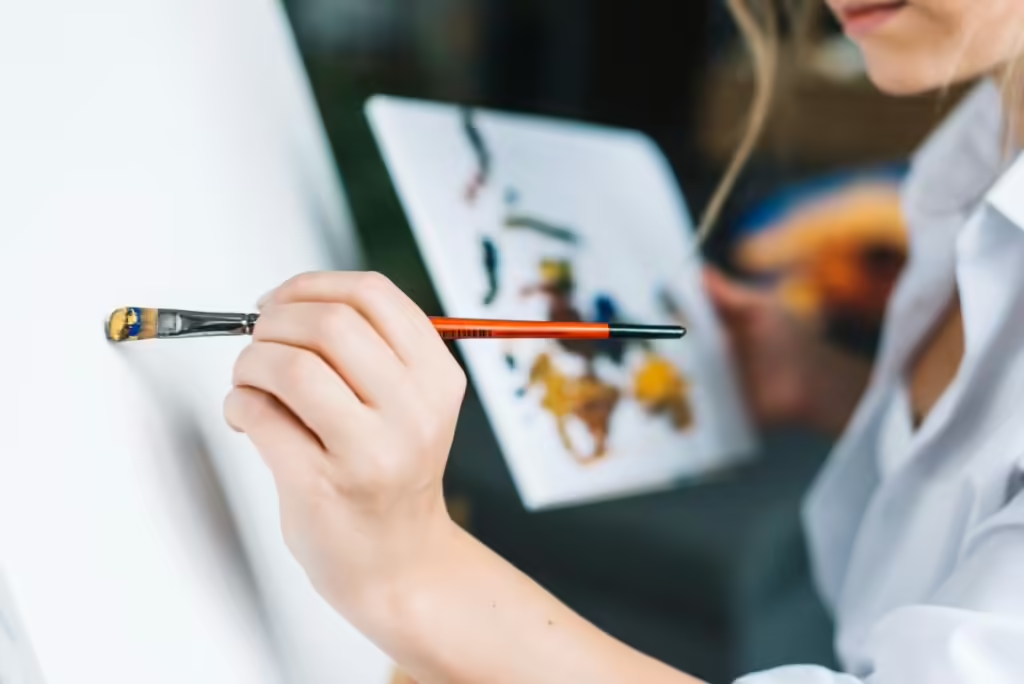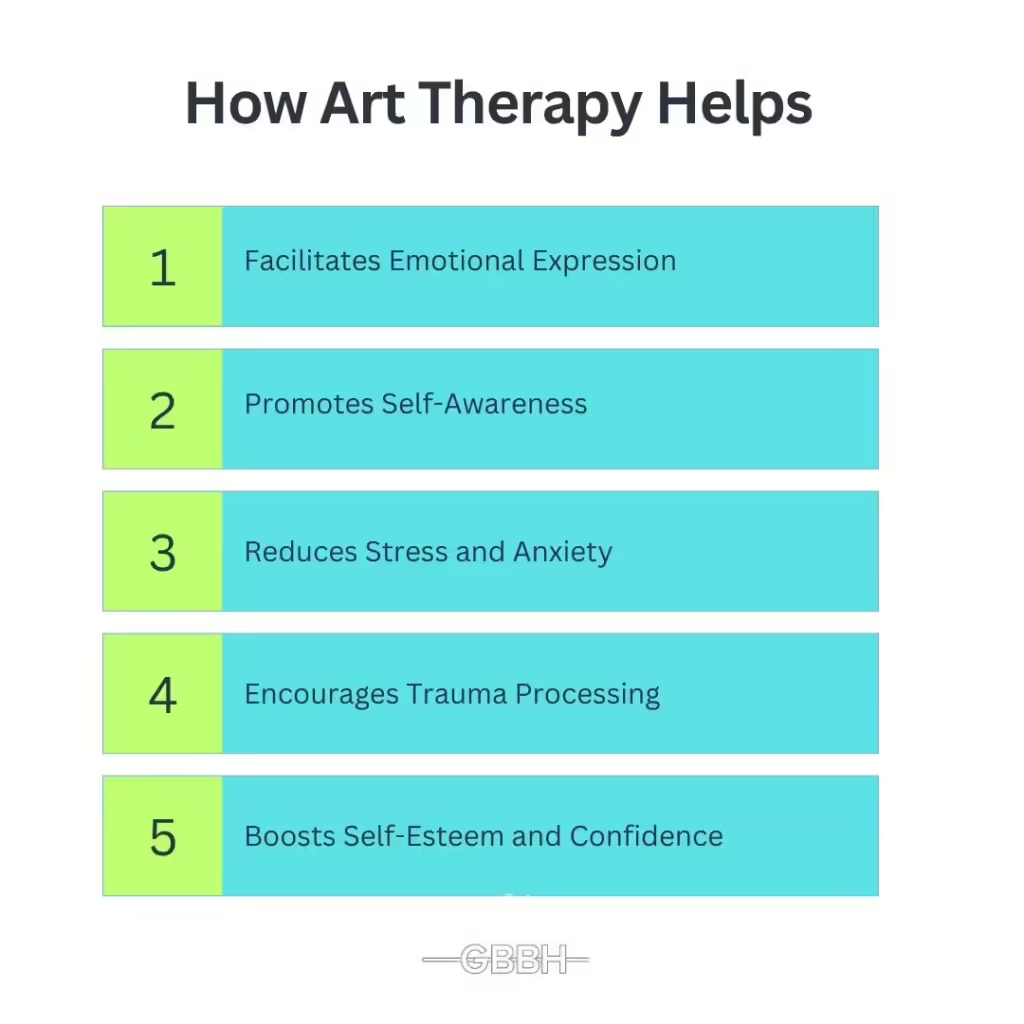Art therapy is a powerful mental health treatment method that utilizes creative processes to help individuals express themselves, explore emotions, and improve mental well-being. By integrating art creation with traditional therapeutic techniques, this form of therapy provides a unique approach to emotional and psychological healing. Whether through painting, drawing, sculpture, or collage, art therapy offers an accessible and impactful way to address mental health challenges, promoting self-awareness and personal growth.
At Greater Boston Behavioral Health, we understand the importance of diverse therapeutic options to support our clients’ mental health journeys. Our Mental Health Programs incorporate a range of therapies, including cognitive-behavioral therapy (CBT), dialectical behavior therapy (DBT), and art therapy, to offer comprehensive care that meets individual needs.
How Does Art Therapy Work?
Art therapy combines traditional therapy practices with creative expression to help individuals tap into their emotions in a non-verbal, intuitive way. Trained art therapists guide clients through art-making activities, using the process as a form of self-expression that can reveal deeper psychological issues. These insights then inform the therapeutic discussion, fostering emotional healing and growth.
While the art created during therapy can serve as a medium for communication, the focus is not on the artistic outcome but on the process itself. The act of creating can help individuals work through difficult emotions, gain new perspectives, and develop healthier coping mechanisms. Art therapy is particularly beneficial for people who may struggle to express their feelings through words, offering a safe and constructive outlet.
Who Can Benefit from Art Therapy?
Art therapy is a versatile treatment option that can benefit individuals of all ages. It is often used in Mental Health Treatment Programs to address a range of issues, including:
- Anxiety and depression
- Trauma and post-traumatic stress disorder (PTSD)
- Grief and loss
- Stress management
- Substance use disorders
- Developmental disorders
At our Mental Health Treatment Center in Massachusetts, we recognize the diverse needs of our clients. Art therapy can be incorporated into broader treatment plans, including Cognitive-Behavioral Therapy (CBT) and Dialectical Behavior Therapy (DBT), to create a well-rounded approach to care. This flexibility allows us to tailor treatment based on individual goals, preferences, and therapeutic needs.
How Art Therapy Helps
- Emotional Release: For many individuals, art therapy offers a way to release emotions that are difficult to express verbally. Creating art provides a safe space to explore feelings like anger, sadness, or frustration, often leading to a sense of relief and empowerment.
- Self-Discovery: Engaging in creative activities can help individuals gain insights into their inner world. As the subconscious mind reveals itself through art, clients can uncover thoughts and feelings that may be affecting their mental health.
- Stress Reduction: The very act of creating can be calming. Whether drawing, painting, or molding clay, engaging in creative work can reduce stress, promote relaxation, and improve emotional regulation.
- Improved Self-Esteem: Successfully completing an art project, even a simple one, can help build confidence and a sense of accomplishment. Art therapy allows clients to see their growth and progress, both emotionally and creatively.
- Communication: For those who struggle to articulate their feelings, art provides an alternative form of communication. This can be particularly helpful for children, individuals with developmental disorders, or anyone who finds traditional talk therapy challenging.
Integrating Art Therapy Into Mental Health Therapy Programs
Art therapy is a valuable complement to other therapeutic methods used at Greater Boston Behavioral Health. Our Mental Health Treatment Center in Massachusetts is committed to providing comprehensive care that includes innovative therapies tailored to each client’s unique mental health needs. Whether combined with CBT, DBT, or other therapeutic modalities, art therapy can be an integral part of a personalized treatment plan.
Our team of trained therapists works closely with clients to determine the most effective treatment methods for their specific conditions. Art therapy, as part of our broader Mental Health Therapy Programs, empowers individuals to take control of their mental health, using creativity as a tool for healing and personal growth.
Why Choose Greater Boston Behavioral Health?
At Greater Boston Behavioral Health, we offer a wide range of Mental Health Treatment Programs designed to meet the diverse needs of our community. Whether you’re seeking Cognitive-Behavioral Therapy, Dialectical Behavior Therapy, or exploring the benefits of art therapy, our experienced team is here to help. We are dedicated to providing personalized care in a compassionate and supportive environment, helping our clients achieve lasting emotional and psychological well-being.
If you’re looking for innovative Mental Health Therapy Programs, including art therapy, in Massachusetts, contact or call Greater Boston Behavioral Health at: (888)278-0716 today to learn how we can support your mental health journey.
Conclusion
Art therapy is a transformative mental health treatment that offers a creative and effective way to address emotional and psychological challenges. At GBBH, we believe in the power of diverse therapies, including art therapy, to support mental wellness. Whether used on its own or as part of a comprehensive treatment plan with Cognitive-Behavioral Therapy (CBT) or Dialectical Behavior Therapy (DBT), art therapy provides a unique outlet for self-expression, healing, and personal growth.
Frequently Asked Questions (FAQ) About Art Therapy
Do I need to be good at art to participate in art therapy?
No, artistic skill is not required to benefit from art therapy. The focus is on the therapeutic process, not the final product. It’s about using creativity as a tool for self-expression and healing, not producing professional-quality art.
What mental health conditions can art therapy help with?
Art therapy can benefit individuals dealing with a range of mental health issues, including anxiety, depression, trauma, PTSD, grief, stress, substance use disorders, and developmental disorders. It’s often incorporated into broader Mental Health Therapy Programs at Greater Boston Behavioral Health.
Is art therapy only for children?
No, art therapy is beneficial for people of all ages. While it is particularly effective for children and adolescents, adults can also experience significant emotional and psychological benefits from engaging in creative therapeutic practices.
How does art therapy fit into a broader mental health treatment plan?
At Greater Boston Behavioral Health, art therapy is often integrated with other therapeutic approaches such as Cognitive-Behavioral Therapy (CBT) and Dialectical Behavior Therapy (DBT). This helps create a comprehensive treatment plan tailored to each individual’s unique mental health needs.
Can art therapy help with stress and anxiety?
Yes, art therapy can be an effective tool for reducing stress and anxiety. Engaging in creative activities can help calm the mind, release tension, and provide a constructive way to process emotions.
How do I know if art therapy is right for me?
If you are looking for a non-verbal way to explore your feelings or struggle with expressing emotions through words, art therapy may be a good option. Our trained therapists at Greater Boston Behavioral Health can assess your needs and determine if art therapy is a suitable addition to your treatment plan.
What should I expect in an art therapy session?
During an art therapy session, a licensed art therapist will guide you through a creative activity, such as drawing or painting, that relates to your therapeutic goals. Afterward, the therapist will help you reflect on your artwork to gain insight into your emotions and experiences.


